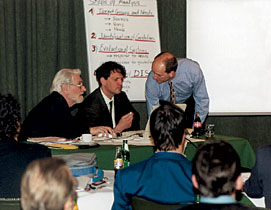The specific objective of Phase 1 (December 2001 to November 2003) is to prepare and initiate basin-wide capacity-building activities, which will be consolidated in the second phase of the Project. A total of 20 project components with 80 activities will be carried out during Phase 1 thus establishing a solid base for the implementation of Phase 2 (December 2003 to November 2006), which will build on the results achieved in the first Phase.
Ivan Zavadsky, the designated Project Manager, comes from Slovakia, one of the beneficiaries of the GEF support. Zavadsky's familiarity with the structures and the work programme of the ICPDR on the one hand and his knowledge of the Danube countries' needs for support make him highly suitable for guiding the project to successful implementation. His most challenging task will be to integrate the Working Groups of the ICPDR, the participating countries and the NGO community in the implementation of the project whilst respecting the objectives, tasks and financing modalities as given by UNOPS, the executing agency of the Project.
In order to elaborate a detailed scope of work and define the modalities of implementation of the various project components, an Inception Workshop is planned for February 7-9, 2002 with the participation of all ICPDR Expert Groups and specialists from the NGO community. Heads of Delegations, respectively their representatives (Country Project Coordinators) will also participate at this workshop and will endorse its results thus setting the direction for successful implementation of the project.
 |
|
| Close co-operration will be necessary. |
Close co-operation will also be established with the forthcoming UNDP-GEF Black Sea Project and the GEF-World Bank Partnership Programme in order to ensure efficient implementation of complementary actions in the wider Danube-Black Sea region. The Memorandum of Understanding, signed between the ICPDR and the ICPBS on November 26, 2001 will be the basis for co-operation between the two Commissions, the co-operating international organisations and the European Commission to assure nutrient reduction and rehabilitation of the ecosystems of the Black Sea.